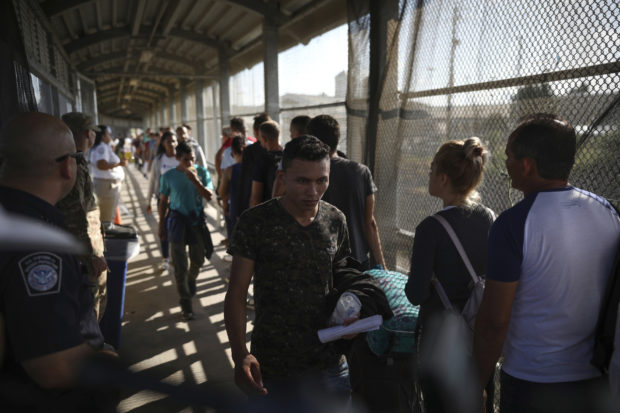US, Mexico widen asylum crackdown to push back all migrants
NUEVO LAREDO, Mexico – A Trump administration program forcing asylum seekers to wait in Mexico has evolved into a sweeping rejection of all forms of migrants, with both countries quietly working to keep people out of the U.S. despite threats to the migrants’ safety.

FILE – In this Aug. 2, 2019, file photo, migrants return to Mexico as other migrants line up on their way to request asylum in the U.S., at the foot of the Puerta Mexico bridge in Matamoros, Mexico, that crosses into Brownsville, Texas. A Trump administration program forcing asylum seekers to wait out the process in Mexico has evolved into a sweeping rejection of all forms of migrants, with both countries quietly working to keep people out of the U.S. despite threats to their safety. (AP Photo/Emilio Espejel, File)
The results serve the goals of both governments, which have targeted unauthorized migration at the behest of President Donald Trump, who threatened Mexico with potentially crippling tariffs earlier this year to force action.
Some people sent to wait in the Mexican border cities of Nuevo Laredo and Matamoros said they never requested asylum, including Wilfredo Alvarez, a laborer from Honduras.
He crossed the Rio Grande without permission to look for work to support his seven children and was unexpectedly put into the program. He was sent back to Mexico with a future court date.
“We thought that if they caught us, they would deport us to our country, but it was not that way,” Alvarez said. “They threw us away here to Mexico, but we are not from here and it’s very difficult.”
Others said they were never asked if they feared persecution in Mexico, despite U.S. government rules that say migrants should not be sent there if they face that risk.
Article continues after this advertisementU.S. border agents give each returned migrant a date for an immigration court hearing at tents set up near the border. But the Mexican government has bused hundreds of migrants to cities around 1,000 miles (1,600 kilometers) away, ostensibly for their safety. And there’s no promise that Mexico will bring migrants back.
Article continues after this advertisementInstead, Mexico is offering to return many Central Americans to the Guatemala border, and others are choosing to leave at their own expense.
A priest running a shelter in Nuevo Laredo called the process a form of “undercover deportation.”
“It’s a way to send them to a country that’s not theirs and save money,” Aaron Mendez said. “And Mexico has not said one word.”
Two weeks after speaking to The Associated Press, Mendez was kidnapped by armed men who entered the shelter. He is still missing.
The effort to keep migrants in Mexico is officially called the “Migrant Protection Protocols,” but it’s better known as the “Remain in Mexico” program. Announced as a plan to crack down on asylum claims, it has been in effect since January and was expanded in July to the eastern end of the U.S.-Mexico border.
In that region, on one side of the border is South Texas’ Rio Grande Valley, where border agents apprehend more migrants crossing illegally than in any other section. On the other side is the state of Tamaulipas, known for its cartel-linked violence and corruption. Tamaulipas is the only U.S.-Mexico border state that the U.S. government warns Americans not to visit due to safety concerns.
The U.S. has said at least 32,000 people have been sent back. Mexico says around 5,500 people have been sent to Nuevo Laredo and 3,000 people to Matamoros.
Migrants in Mexican border cities said they were told they would receive help when they were sent back to Mexico, a promise that for many has not been kept.
Thirteen people told the Associated Press they were not asked for any information about their cases by U.S. border agents.
“They only asked for a name, a fingerprint, and then ‘out,'” said Blanca, a Guatemalan woman who was sent back to Nuevo Laredo in July with 15 relatives. Blanca asked that her last name be withheld due to fear that she would be harmed.
She said she was prepared to tell border agents that gang members had killed her sister, leading the rest of her family to flee. She brought paperwork documenting the attack, but said, “We couldn’t even show them.”
Jodi Goodwin, an immigration attorney in Harlingen, Texas, has agreed to represent for free 11 cases involving people waiting in Matamoros, including three families and a pregnant woman from Peru. Goodwin persuaded border agents on Sunday to allow the pregnant woman inside the U.S. as well as a woman accompanied by a baby with Down syndrome. The next day, she said, the pregnant woman had been sent back to Mexico.
In nearby Reynosa, human rights lawyer Jennifer Harbury has worked with Mexican attorneys to help waiting migrants obtain protective orders against people who have attacked them. In a recent blog post, Harbury said she had expected around 200 people to apply for orders. Instead, at least 500 people came in one day. /gsg